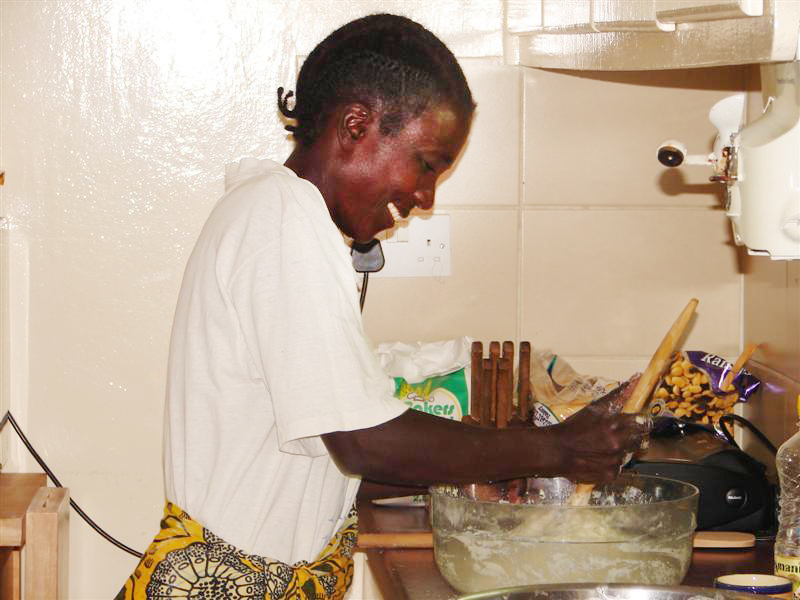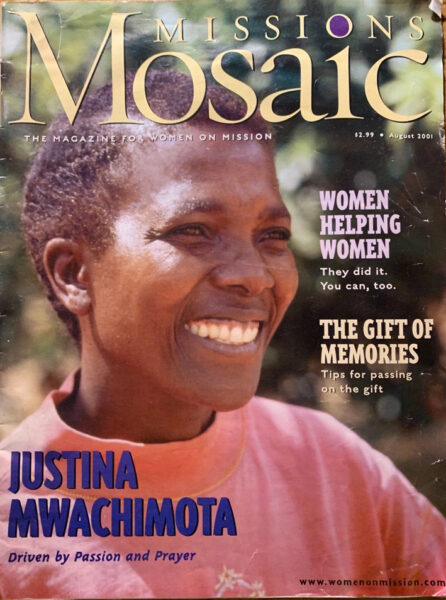African Missionary Hero: Wild Child

As the village drifted off to sleep, Justina slept in the bush alone. But God was watching over the child.
In 1960, the villagers of Chimbwete, Zambia, did not know Jesus or that someday the little Justina would be a great evangelist and servant of God. At the time, she was an outcast five-year-old girl shivering in the darkness. Only God knew the plans He had for that “wild child” and all that she would go through as God equipped her for future service. It would be thirty-three more years before she came to Christ, but God was at work from the very beginning.
Justina Mwachimota was born in 1955. Her mother followed her father to Chimbwete village, and they lived there with her baby brother. However, a dispute soon arose between her mother and father, and he left to live with another woman in another village, leaving Justina with her mother and brother. Now stranded in her ex-husband’s home village and needing to provide for her children, Justina’s mother took a job as a housemaid on a farm. She left Justina and her baby brother with their father’s sister, hoping she would care for them until she could return. This ended up being the worst thing that could happen.
Justina’s aunt was furious about being burdened with her brother’s children while the mother moved away. She often beat Justina for no reason and whispered in her ear that she would kill her if she ever told anyone. Five-year-old Justina could not understand why her aunt could not be pleased and why everyone hated her. All she knew was that she had to survive. Whenever her aunt’s wrath peaked and she threatened to kill Justina, Justina fled to live in the bush. She was swift and very clever, and it was easier to live like a wild child in the fields than to run the risk of her aunt catching her.
Sometimes Justina stayed away from the village for weeks at a time. While the people slept in the village at night, she slept in the fields in a sisal sack and lived off the fresh maize, sugar cane, and other things she could find in the bush. When the people in the village went out in the fields during the day to protect the crops from animals, she snuck into the village and ate sweet potatoes or any other food she could steal from the homes. Justina was indeed a wild child. She did not bathe and had only one tattered dress and knotted hair that could not be combed. During those weeks when she hid from her aunt, she didn’t see people or let them come close to her. They often forgot about her, only noticing her footprints when they returned to the village after a long day in the fields.
Her father’s father decided to end all of this. He called the people together and said, “We need to send Justina to her mother’s village. She cannot live like this. What if a lion kills her or the leopard finds her first? She has no idea of the danger she is facing, and if she dies, her mother’s family will blame us.” So Justina’s grandfather tracked her and found her hiding in the bush. He knew she was too fast to catch, so he called to her, “Justina, don’t run! I have a gun, and if you run, I will shoot! It is not safe for you to live like this. Come to me, and I will take you to your mother.” When Justina heard that she could see her mother, she came out of the bush.
Justina’s father was called, and he came with a bicycle. As Justina and her dad drew near her mother’s village, everyone was gone. Rather than wait and have to answer many questions, Justina’s father left her there and disappeared on the bicycle. When Justina’s maternal grandmother returned to the village and saw her, she was shocked and cried out, “Is this truly my granddaughter, is this Justina?”
Her mother’s family cared for her. It was the first time the “wild child” experienced a family who loved her. Justina began to know happiness and even went to school. She stopped her wild behaviors and now seemed like an average child.
However, her wild days were not over as she became a woman. When Justina was only sixteen years old, she got involved with a man named Isaac and began living with him. She had two sons with him but eventually left him because of how he mistreated her. She later had three more children from relationships with different men. Justina made her living brewing homemade alcohol. She not only sold alcohol but was a drunkard herself and lived a wild life. Like the woman at the well in John 4, Justina had become a woman with a sordid past whom God still wanted to save and use.

In 1991 at age thirty-six, Justina lived in Chongwe. She was walking with her youngest child on her back when she met a young seminary student named Delix who invited her to attend a Jesus Film crusade in town that night at the community hall. She felt strangely drawn to the event and promised to come. When she saw that film, she was amazed to hear this Jesus speaking a language she knew. In the middle of the film, they paused the projector where Jesus was hanging on the cross, and Delix began to preach. He shared how our sins had nailed Jesus to the cross and He was sacrificed for us.
Justina was broken and asked herself, “Is it truly I who nailed Jesus to the cross with my sin?” She responded to the invitation to learn more and was instructed to return the next day for further counsel. That next day she repented of her sin and gave her life to Jesus.
For the first time, Justina felt spiritual peace and knew that she had found the meaning of life. She stopped brewing alcohol. She told her current boyfriend, the father of her last born, that she could not see him anymore. She said, “Please go and tell your wife I am sorry for my actions, and I will never see you again.” He pleaded with her not to chase him away, and he even returned multiple times to try to convince her to become one of his wives. But she answered him, “I am now married to Jesus. He is all that matters.”
Justina told everyone she met about Jesus. She was convinced that the world was dying and Jesus was the only hope. She went everywhere she could to help people find the peace she knew.
Delix, the seminary student, worked with a Baptist missionary in Chongwe. They were planting a church, and Justina began worshiping there and learning the Bible. She learned the importance of prayer, evangelism, and Bible study from the believers in Chongwe. Yet, she thought about the lost people among her father’s tribe and soon began traveling to Nsompolola to share the gospel there. The missionary told her, “We have another seminary student who can be the pastor. Help us get that church started, and we will ask him to go there on the weekends.” Justina worked behind the scenes in Nsompolola, taught the ladies, witnessed to people in the village, and led the children.

This sweet, unassuming woman became the heart and soul of God’s work in the Chongwe district. She even studied and graduated with the first class of the Chongwe Bible School. Justina went on to help the missionary and his team start more than twenty Baptist churches in Eastern Zambia. In 2001, Justina was voted African Woman of the Year by the magazine Missions Mosaic.
Now Justina is sixty-eight years old, and she still lives in Chongwe. She is still active in her church and is still busy telling people about Jesus, though she cannot travel as much as she used to. Justina often says, “If you have Jesus, it is difficult to keep quiet.”
When she reflects on her childhood and all the things she suffered, Justina sees the hand of God in it all. “Yes,” she says, “God was with me and protecting me, even when I didn’t know Him. … Everything I went through was just to prepare me for what was to come.”
Of course, God did not desire for her to suffer as a child, but God allowed that suffering to make her strong and equip her for the hard life of missions. Justina believes it was easy for her to do the difficult tasks of church planting—going to remote places and sleeping on the ground—because she had already experienced that as a child. She believes she can help women who suffer and sympathize with children who don’t know Jesus, because she has lived that life and knows what people face. She knows what it is like to be lost, and she has known the life of sin. Her past has created an urgency in her to help others find salvation because she knows the emptiness of their lives. As Jesus taught, those forgiven the most tend to love the most. The “wild child” endured much so she could serve much. She lived a wild life, but she experienced the forgiveness of the Savior as he tamed her heart.
What has God prepared for you? What things are you going through that seem difficult now but that God can use to make you strong in the future? He sees you and loves you, and He has a plan for you just like He did for Justina.